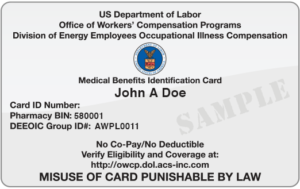The EEOICPA provides certain Department of Energy (DOE) workers with free medical benefits if they were exposed to radiation or other toxins. This means that eligible individuals who suffer from covered illnesses do not need to pay us anything to receive services related to treatment of that injury. As a result, we do not need to bill Medicaid or private insurers for home care or nursing services.
Free Medical Benefits
After an employee has been approved under the EEOICPA, he or she receives a medical benefits identification card that must be presented at the time of treatment. If a cardholder shows this identification, he or she will not owe a copay or deductible. Additionally, in the off chance that covered workers had to pay an out-of-pocket expense before their claim was approved, they can use these cards to collect reimbursement for those costs.
Workers covered by the EEOICPA are guaranteed coverage of certain medical costs, including:
- Ambulance services
- Consultations
- Diagnostic laboratory testing
- Doctor’s visits
- Inpatient and outpatient hospital bills
- Medical equipment
- Prescription drugs
- Radiological testing
- Reasonable and customary medical care
- Travel costs directly associated with treatment
- Other treatment-related expenses
These types of medical costs are provided free of charge to covered patients and are billed to EEOICPA’s medical bill payment agent by medical providers.
Private Insurers and Medicaid
Although all medical treatment related to a worker’s injury is covered by EEOICPA, any costs incurred to treat illnesses that are unrelated to exposure must be paid by the patient’s private insurance provider or Medicaid. This means that individuals who seek aid from United Energy Workers Healthcare and Four Corners Health Care or from a similar establishment can expect only to receive the medical costs associated with treating a listed injury free of charge. Covered conditions include radiation-induced cancers, such as:
- Leukemia
- Multiple myeloma
- Thyroid, breast, and ovarian cancers
- Lung and bone cancer
- Cancer of the esophagus
- Pancreatic cancer
- Brain cancer
- Kidney and bladder cancer
- Certain skin cancers
- Laryngeal cancer
Other covered conditions include:
- Certain types of lung disease
- Chronic silicosis
- Pulmonary fibrosis
- Chronic beryllium disease
- Beryllium sensitivity
Many of these conditions are extremely serious, and in some tragic cases, are terminal. As a result, the care required for treatment and rehabilitation is extensive and could include personal care, light housekeeping, meal preparation, medical monitoring, and the administration of medications, all of which is covered by EEOICPA. However, if a person is suffering from multiple ailments, one of which is not covered by the EEOICPA, he or she will need to seek partial coverage from an insurer. In these cases, one of our experienced team members can attempt to bill patients’ insurers, so that they won’t need to cover the costs themselves.
Contact United Energy Workers Healthcare and Four Corners Health Care Today
EEOICPA only pays for medical expenses related to covered injuries, so the billing situation can become complicated when a patient is suffering from multiple illnesses, only some of which are covered. If you have questions about our services, please contact a member of the home health care provider team at United Energy Workers Healthcare and Four Corners Health Care today.
Who We Serve
Do you have this card?

If you already have this card, then you are already approved to receive no-cost medical benefits! Call us to get started today.
In order to be eligible for EEOICPA/RECA benefits, an individual must have been employed at a covered Department of Energy facility, an approved atomic weapons facility, or at a permitted beryllium vendor. An individual must also have one of the covered conditions as a result of exposure to radiation, beryllium, or silica while employed at an accepted facility. In addition, uranium miners, millers, and ore transporters are eligible for benefits if they develop an illness as a result of exposure to toxic substances (such as radiation, chemicals, solvents, acids, and metals) and worked at a facility covered under RECA. Eligibility requirements vary by location and condition.